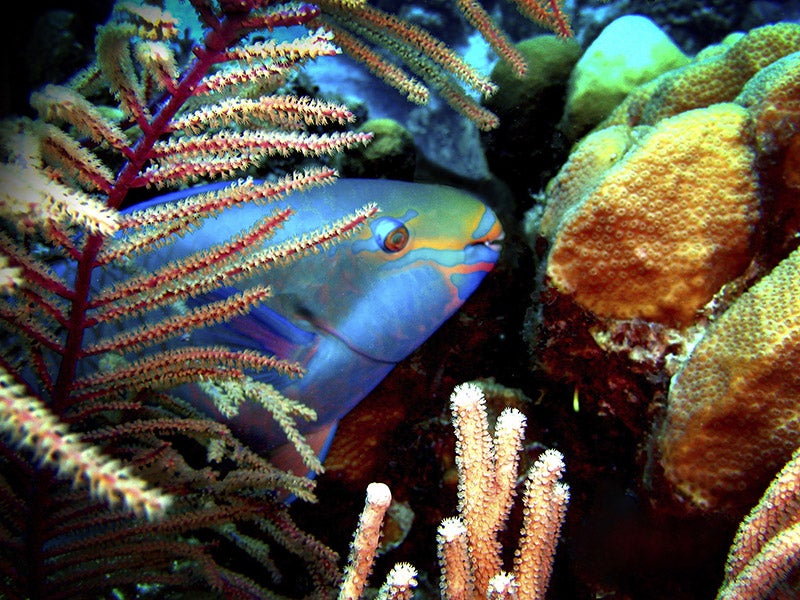Coral and Parrotfish: The Fight for Recovery
Earthjustice sued the National Marine Fisheries service to better protect coral, and won. The 2013 decision will help protect parrotfish and coral, but only if the National Marine Fisheries Service uses the new data to improve management. The agency must do more to restore Caribbean reefs.

This page was published 11 years ago. Find the latest on Earthjustice’s work.
When Jacques Costeau’s film crew first captured the beauty and abundance life among Caribbean coral reefs, we fell in love with the ocean.
Today, many of those same reefs are collapsing. Once vibrant coral reef ecosystems look like rubble fields. The fish are few, and algae has smothered and killed the reefs.
Not so long ago, elkhorn and staghorn corals were the main reef-building coral species in the Caribbean. Yet these species have declined by as much as 98 percent since the 1970s thanks to stressors including overfishing, disease, and climate change. As the corals decline, so does quality habitat for fish and other creatures.
The fate of Caribbean coral reefs is in our hands. And there is still hope we can save them. Given protection, coral reefs can regrow. We must reduce those things that harm coral and increase the things that help coral recover.
One way to help Caribbean coral is to protect the janitor of the coral reef, the colorful, hard-working parrotfish.
Taking Action to Protect Coral
Earthjustice sued the National Marine Fisheries service to better protect coral, and won. The 2013 decision will help protect parrotfish and coral, but only if the National Marine Fisheries Service uses the new data to improve management. The agency must do more to restore Caribbean reefs.
The fisheries service is in charge of conserving resources that belong to everyone, including coral reefs in U.S. waters. Tell them you are concerned and watching. Tell them you want them to implement science-based fishery management measures that will foster larger, more diverse parrotfish populations and help restore coral species in the Caribbean.
CORAL: The Backbone of the Ocean Ecosystem
For fish, coral reefs serve as nursery and breeding grounds, food supply, and protection from predators. When coral reefs collapse, the health of every species that depends on them is imperiled.
Disease, pollution, algae overgrowth and acidification due to climate pollutants have all played a role in harming Caribbean coral. Protecting coral reefs from local threats like excessive fishing is critical to ensuring that they can withstand other, global threats.
In 2005, scientists analyzed the population trends of these elkhorn and staghorn coral over recent decades and found that:
Both species underwent precipitous declines in the early 1980s throughout their ranges and this decline has continued.
These findings helped establish that coral deserved protection. On page 60 of their report you can see the dramatic population declines they documented.
Today, excessive algal growth is choking out coral and degrading the habitat that other reef creatures—such as fish, sea turtles and lobsters—depend on. The situation became so bad that environmentalists petitioned the agency to protect elkhorn and staghorn coral under the Endangered Species Act. Now, the Fisheries Service must conserve and restore these corals and their reef habitat.
In January 2012, Earthjustice filed a lawsuit in federal court seeking to ensure that the Fisheries Service gave these corals and their reef habitat in the Caribbean the protections they are due under the law. The lawsuit claimed that the Fisheries Service had allowed unsustainable fishing despite science showing that parrotfish and other grazing fish play a key role in promoting the health of coral reefs.
By allowing the targeted fishing of parrotfish without any effective system for tracking and limiting the impacts of that fishing on corals, the government was violating the Endangered Species Act. The court ordered the agency to redo its monitoring plan to ensure that the agency can detect and prevent harm to staghorn and elkhorn coral caused by fishing.